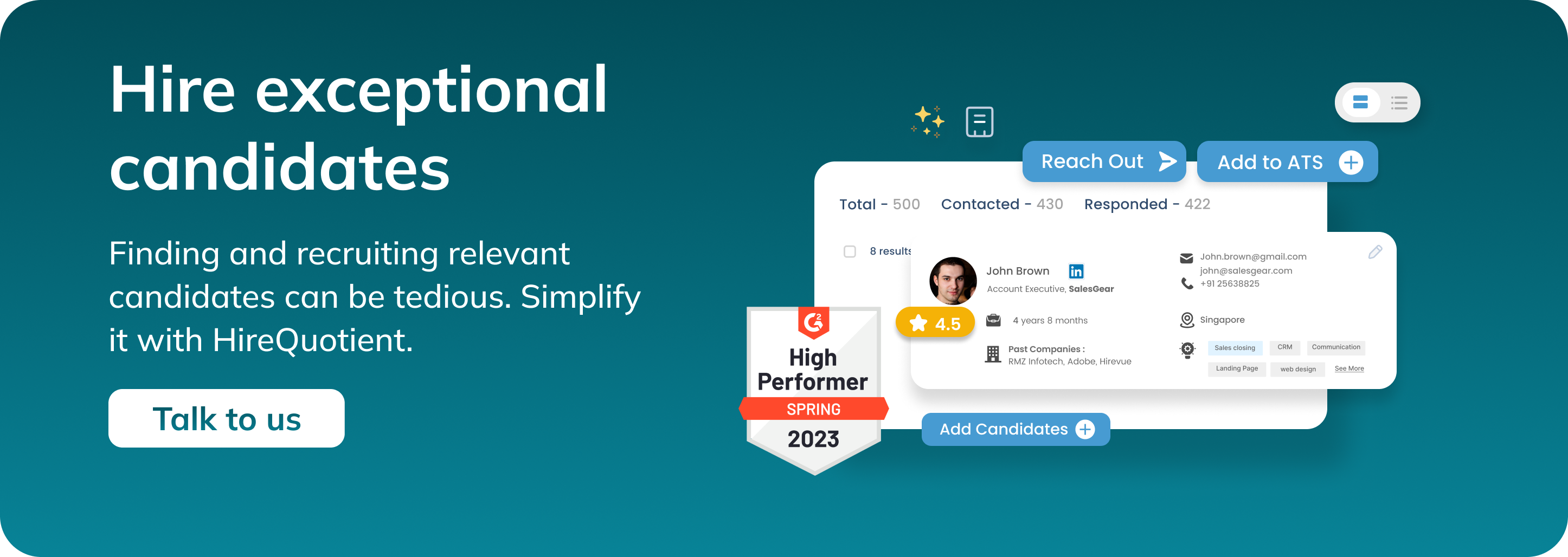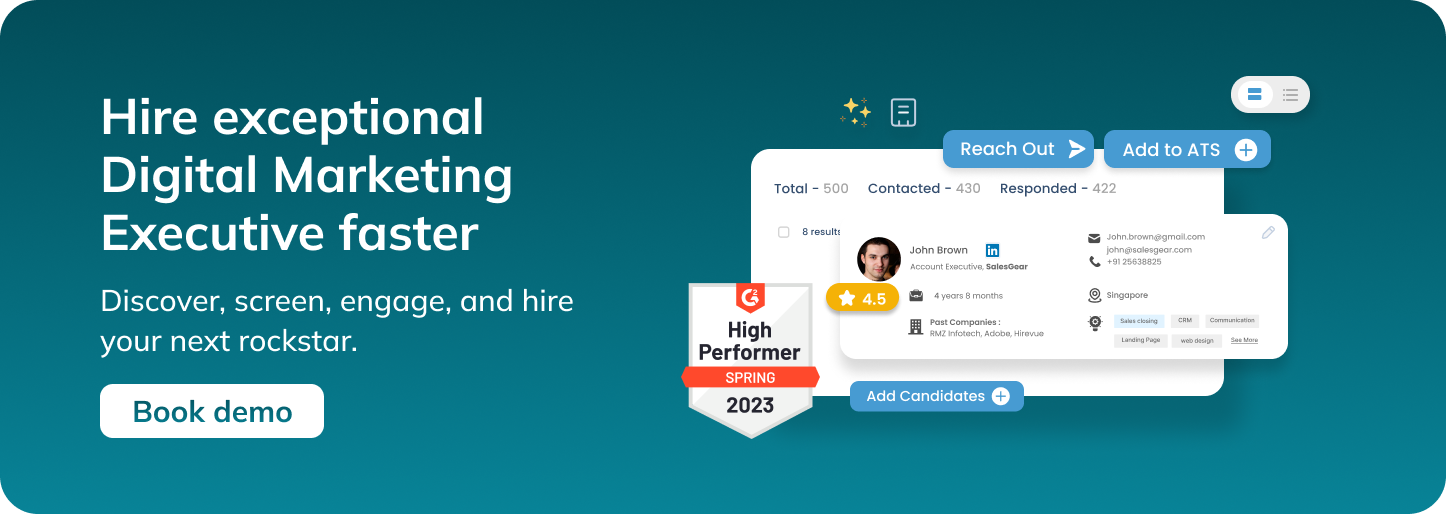Top 50 Digital Marketing Executive Interview Questions and Answers
Published on February 2nd, 2024
Mastering digital marketing is essential for businesses aiming to engage consumers effectively, increase organic traffic, and boost sales. However, finding the right Digital Marketing Executive can also be challenging amidst technological advancements and shifting consumer behaviors.
To aid recruiters and hiring managers in this endeavor, we present a comprehensive collection of Digital Marketing Executive interview questions tailored to different digital marketing roles. Covering various domains such as Brand Marketing, SEO, SEM, Social Media Marketing, and Generic Digital Marketing, our curated questions help assess candidates' knowledge, skills, and experience.
With categories ranging from brand consistency to audience segmentation and integrated marketing campaigns, our collection provides targeted questions to evaluate candidates thoroughly.
Let's embark on the journey to discover the talent that will drive your digital marketing initiatives forward.
Brand Marketing Interview Questions
1. How do you ensure brand consistency across various digital marketing channels?
Answer: Brand consistency is maintained by adhering to brand guidelines for design, tone, and messaging across all digital platforms. Regular audits and communication with team members ensure alignment with brand values.
2. Can you discuss your approach to building brand awareness through digital marketing initiatives?
Answer: Building brand awareness involves creating engaging content, leveraging social media platforms, and collaborating with influencers. Engaging storytelling and consistent messaging help in establishing brand recall.
3. How do you measure brand sentiment and perception in digital marketing campaigns?
Answer: Brand sentiment can be measured through social listening tools that monitor mentions, sentiment analysis, and customer feedback. Surveys and polls can also provide insights into brand perception.
4. Can you share examples of successful brand storytelling campaigns you've executed?
Answer: An example would be our 'Behind the Scenes' series, which showcased the human side of our brand. By featuring employees and their stories, we fostered a deeper connection with our audience.
5. How do you maintain brand authenticity and integrity in digital marketing efforts?
Answer: Brand authenticity is maintained by staying true to our values and delivering on promises. Transparency, genuine engagement with customers, and ethical practices are key to maintaining brand integrity.
6. How do you approach brand positioning in a competitive market landscape?
Answer: Brand positioning involves identifying unique value propositions and differentiation factors that resonate with target audiences. Market research, competitor analysis, and customer feedback inform brand positioning strategies.
7. Can you discuss your experience with brand identity development and brand architecture?
Answer: Brand identity development includes designing visual elements such as logos, colors, and typography that reflect brand values and personality. Brand architecture involves structuring and organizing brand assets and sub-brands for clarity and consistency.
8. What strategies do you use to build brand loyalty and advocacy among customers?
Answer: Building brand loyalty involves delivering consistent experiences, providing exceptional customer service, and fostering emotional connections with customers. Loyalty programs, rewards, and exclusive offers also encourage repeat purchases and advocacy.
9. How do you handle brand crises or negative publicity on digital platforms?
Answer: Handling brand crises requires transparency, honesty, and swift action. Listening to customer feedback, addressing concerns promptly, and communicating effectively can help mitigate negative publicity and rebuild trust.
10. Can you share examples of successful brand partnerships or collaborations you've executed?
Answer: Successful brand partnerships involve aligning with complementary brands or influencers to reach new audiences and achieve mutual goals. Collaborative campaigns, co-branded products, and joint events can drive brand awareness and engagement.

SEO Interview Questions
11. What are the key factors you consider when conducting keyword research for SEO?
Answer: I focus on relevance, search volume, competition, and user intent when conducting keyword research. Long-tail keywords and semantic variations are also considered for comprehensive coverage.
12. How do you optimize on-page elements for better search engine visibility?
Answer: On-page optimization involves optimizing meta tags, headings, and content with relevant keywords. Improving site speed, mobile responsiveness, and user experience also contribute to better visibility.
13. Can you discuss your approach to earning high-quality backlinks for SEO?
Answer: I prioritize creating valuable content that naturally attracts backlinks. Outreach to relevant websites, guest blogging, and participating in industry forums also help in earning high-quality backlinks.
14. How do you analyze and improve website performance for SEO purposes?
Answer: Website performance is analyzed using tools like Google Analytics and Search Console. I monitor metrics such as organic traffic, bounce rate, and conversion rate, and make improvements based on data insights.
15. What are your strategies for staying updated with search engine algorithm changes?
Answer: I regularly follow industry blogs, attend webinars, and participate in SEO communities to stay updated with algorithm changes. Experimentation and testing help in understanding the impact of updates on rankings.
16. How do you approach technical SEO optimization for website performance?
Answer: Technical SEO optimization involves optimizing website structure, navigation, and indexing for search engines. Improving site speed, mobile responsiveness, and schema markup enhance user experience and search engine visibility.
17. Can you discuss your experience with local SEO strategies and tactics?
Answer: Local SEO strategies focus on optimizing online presence for location-based searches and Google My Business listings. NAP consistency, local citations, and geo-targeted content help businesses rank higher in local search results.
18. What role do content marketing and link building play in SEO efforts?
Answer: Content marketing involves creating high-quality, relevant content that attracts organic traffic and earns backlinks from authoritative websites. Link-building strategies such as outreach, guest blogging, and content promotion improve domain authority and search rankings.
19. How do you approach SEO audits and performance analysis for website optimization?
Answer: SEO audits identify technical issues, on-page optimizations, and opportunities for improvement on websites. Performance analysis involves monitoring key metrics such as organic traffic, keyword rankings, and backlink profiles using tools like SEMrush or Moz.
20. What are your strategies for optimizing for voice search and featured snippets?
Answer: Optimizing for voice search involves targeting long-tail keywords, providing concise answers to user queries, and optimizing content for natural language and conversational queries. Structured data markup and FAQ pages can also improve the chances of appearing in featured snippets.
Also read: Digital Marketing Executive Job Description
SEM Interview Questions
21. How do you structure and optimize PPC campaigns for maximum ROI?
Answer: I structure PPC campaigns based on relevant keywords, ad groups, and targeting options. Continuous monitoring, A/B testing, and optimization of ad copy and landing pages help in maximizing ROI.
22. Can you discuss your experience with Google Ads and other PPC platforms?
Answer: I have experience managing Google Ads campaigns, including search, display, and shopping ads. I also have experience with other PPC platforms such as Bing Ads and social media advertising platforms.
23. What metrics do you prioritize when analyzing the performance of SEM campaigns?
Answer: I prioritize metrics such as click-through rate (CTR), conversion rate, cost per acquisition (CPA), and return on ad spend (ROAS) when analyzing SEM campaign performance. These metrics help in evaluating the effectiveness and efficiency of campaigns.
24. How do you approach bidding strategies and budget allocation for SEM campaigns?
Answer: Bidding strategies are determined based on campaign goals and target ROI. I use automated bidding strategies like target CPA or ROAS to optimize bids for conversions. Budget allocation is based on performance data and campaign priorities.
25. Can you discuss your experience with remarketing and audience targeting in SEM?
Answer: I have experience implementing remarketing campaigns to re-engage website visitors and past customers. Audience targeting involves segmenting audiences based on demographics, interests, and behavior to deliver personalized ads.
26. How do you create compelling ad copy and ad creatives for PPC campaigns?
Answer: Compelling ad copy involves crafting attention-grabbing headlines, persuasive messaging, and clear calls-to-action that resonate with target audiences. A/B testing ad variations and ad extensions helps optimize performance and click-through rates.
27. Can you discuss your experience with display advertising and remarketing strategies?
Answer: Display advertising involves targeting visual ads on websites, apps, and social media platforms to reach specific audiences. Remarketing strategies target users who have previously interacted with a website or app, encouraging them to revisit and complete desired actions.
28. What role do landing pages and conversion rate optimization (CRO) play in SEM campaigns?
Answer: Landing pages are optimized web pages designed to capture leads or convert visitors into customers. Conversion rate optimization involves testing page elements, improving usability, and reducing friction to maximize conversions and ROI from SEM campaigns.
29. How do you approach bidding strategies and budget management for SEM campaigns?
Answer: Bidding strategies determine ad placements and costs in search engine advertising auctions. Budget management involves allocating funds effectively across campaigns, ad groups, and keywords to achieve maximum return on investment (ROI).
30. Can you discuss your experience with Google Shopping campaigns and product listing ads (PLAs)?
Answer: Google Shopping campaigns showcase product listings and prices directly within Google search results, targeting users with high purchase intent. Optimizing product feeds, bidding on relevant keywords, and monitoring product performance are key aspects of managing PLAs.
Social Media Marketing Interview Questions
31. How do you develop a social media content strategy that aligns with brand goals?
Answer: I develop a social media content strategy by identifying brand objectives, target audience preferences, and content themes. Content calendars, audience personas, and competitor analysis help in creating relevant and engaging content.
32. Can you discuss your approach to community management on social media platforms?
Answer: Community management involves actively engaging with followers, responding to comments and messages, and participating in relevant conversations. Building relationships and fostering community growth are key objectives.
33. How do you measure the effectiveness of social media campaigns?
Answer: Social media campaign effectiveness is measured using metrics such as reach, engagement, click-through rate (CTR), and conversion rate. Social media analytics tools provide insights into campaign performance and audience behavior.
34. What strategies do you use to increase organic reach and engagement on social media?
Answer: I use strategies such as posting relevant and timely content, leveraging user-generated content, and optimizing post timing and frequency. Engaging with followers and participating in conversations also help in increasing organic reach and engagement.
35. Can you discuss your experience with paid advertising on social media platforms?
Answer: I have experience creating and managing paid advertising campaigns on social media platforms such as Facebook, Instagram, LinkedIn, and Twitter. Targeting options, ad formats, and budget optimization contribute to campaign success.
36. How do you develop a social media content calendar and content strategy?
Answer: Social media content calendars outline planned content themes, topics, and posting schedules across social media platforms. Content strategies involve creating engaging content formats, storytelling, and user-generated content to drive engagement and brand awareness.
37. Can you discuss your approach to influencer marketing and brand collaborations on social media?
Answer: Influencer marketing involves partnering with social media influencers to promote products or services to their followers. Brand collaborations include co-sponsored content, giveaways, and joint campaigns that leverage each other's audience and credibility.
38. What metrics do you prioritize when analyzing social media campaign performance?
Answer: Key social media metrics include reach, engagement, impressions, click-through rate (CTR), conversion rate, and return on ad spend (ROAS). Social media analytics tools provide insights into audience demographics, behavior, and sentiment to optimize campaign performance.
39. How do you leverage user-generated content (UGC) and community engagement on social media?
Answer: User-generated content involves sharing content created by customers, fans, or followers, showcasing authentic experiences and brand advocacy. Community engagement involves actively participating in conversations, responding to comments, and fostering a sense of community among followers.
40. Can you discuss your experience with social media advertising platforms and campaign optimization?
Answer: Social media advertising platforms such as Facebook Ads, Instagram Ads, LinkedIn Ads, and Twitter Ads offer targeting options, ad formats, and optimization tools to reach specific audiences and achieve campaign objectives.
Generic Digital Marketing Interview Questions
41. How do you approach developing a comprehensive digital marketing strategy?
Answer: Developing a digital marketing strategy involves defining goals, identifying target audience segments, conducting market research, and selecting appropriate channels and tactics. Continuous monitoring and optimization ensure strategy effectiveness.
42. Can you discuss your experience with marketing automation platforms and workflows?
Answer: I have experience implementing marketing automation platforms such as HubSpot, Marketo, or MailChimp to automate repetitive tasks, nurture leads, and streamline marketing processes. Workflows are designed based on customer journeys and engagement stages.
43. What role does content marketing play in a digital marketing strategy, and how do you approach it?
Answer: Content marketing plays a crucial role in attracting and engaging audiences throughout the buyer's journey. I approach content marketing by creating valuable, relevant content that addresses audience needs and interests and supports business objectives.
44. How do you integrate different digital marketing channels for a cohesive marketing strategy?
Answer: Integration involves aligning messaging, branding, and customer experience across multiple channels such as email, social media, SEO, and paid advertising. Consistent messaging and cross-channel promotion enhance campaign effectiveness.
45. How do you stay updated with industry trends and best practices in digital marketing?
Answer: I stay updated by regularly reading industry blogs, attending webinars and conferences, and participating in online communities and forums. Experimentation and testing also help in staying ahead of industry trends and best practices.
46. How do you approach audience segmentation and targeting for digital marketing campaigns?
Answer: Audience segmentation involves dividing target audiences into groups based on demographics, behaviors, and interests. Targeting involves delivering personalized messaging and content to each segment through relevant channels and touchpoints.
47. Can you discuss your experience with marketing automation platforms and email marketing campaigns?
Answer: Marketing automation platforms automate repetitive tasks, nurture leads, and deliver personalized content through email marketing campaigns. Strategies include segmentation, drip campaigns, and lead scoring to optimize engagement and conversions.
48. What role do data analytics and reporting play in digital marketing strategy?
Answer: Data analytics and reporting provide insights into campaign performance, audience behavior, and ROI. Key metrics, dashboards, and data visualization tools help in measuring effectiveness, optimizing strategies, and informing decision-making.
49. How do you stay updated with industry trends and best practices in digital marketing?
Answer: Staying updated involves reading industry blogs, attending webinars and conferences, and participating in online communities and forums. Continuous learning, experimentation, and testing help in adapting to changing trends and technologies.
50. Can you discuss your experience with cross-channel marketing strategies and integrated marketing campaigns?
Answer: Cross-channel marketing involves delivering consistent messaging and experiences across multiple channels and touchpoints. Integrated marketing campaigns align strategies, tactics, and messaging to achieve overarching business objectives and maximize impact.
51. What is the advantage of digital marketing over traditional marketing?
Yes, the opportunities in this era of digital marketing are truly amazing. The following are some of the factors that make digital marketing more successful than traditional marketing:
- Cost-effectiveness
- Higher internet penetration
- Easy analysis, better tracking of leads and performance & usually better performance-focused ROI
- Better interaction with customers
- Faster / Real-time optimization
- Global reach
- Easy access to product/service information for consumers
Conclusion
Finding the right talent in digital marketing is paramount for businesses striving to thrive in an ever-evolving landscape. As consumer preferences shift towards meaningful brand interactions, the role of a digital marketing executive becomes indispensable in driving engagement, increasing traffic, and ultimately boosting sales.
However, navigating the hiring process can be daunting without the right resources. That's where EasySource comes in. With our curated list of top 50+ digital marketing executive interview questions and answers, recruiters and hiring managers can efficiently assess candidates' skills and experience to find the perfect fit for their organization.
From brand marketing to SEO, SEM, and social media marketing, these questions cover essential areas crucial for success in the digital realm.
Let EasySource streamline your hiring process and help you build a high-performing digital marketing team tailored to your organization's needs. Let's dive in and discover the talent that will drive your digital marketing initiatives forward.
Authors

Soujanya Varada
As a technical content writer and social media strategist, Soujanya develops and manages strategies at HireQuotient. With strong technical background and years of experience in content management, she looks for opportunities to flourish in the digital space. Soujanya is also a dance fanatic and believes in spreading light!
Hire the best without stress
Ask us how
Never Miss The Updates
We cover all recruitment, talent analytics, L&D, DEI, pre-employment, candidate screening, and hiring tools. Join our force & subscribe now!
Stay On Top Of Everything In HR



